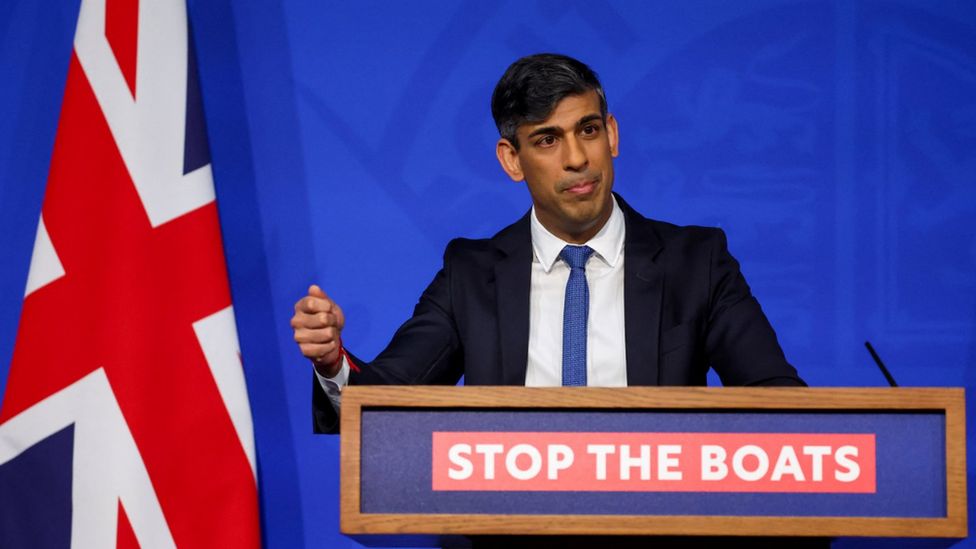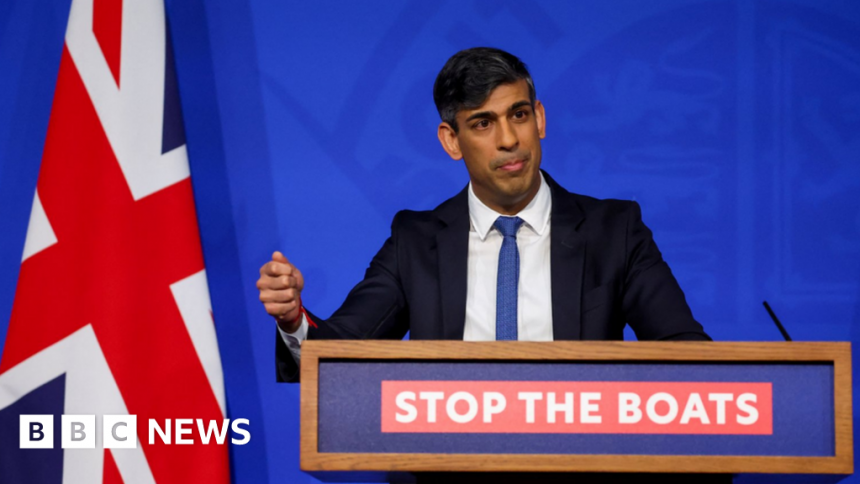What is the UK’s plan to send asylum seekers to Rwanda and how many could go?
-
Published

Plans for the UK to send some asylum seekers to Rwanda have been passed by Parliament.
The Rwanda bill was introduced to allow the scheme to go ahead after the Supreme Court ruled it was unlawful.
What is the Rwanda asylum plan?
Under the scheme, the government says any asylum seeker entering the UK “illegally” after 1 January 2022 could be sent to Rwanda, to have their claims processed there.
If successful, they could be granted refugee status and allowed to stay in the landlocked east-central African country.
If not, they could apply to settle in Rwanda on other grounds, or seek asylum in another “safe third country”.
No asylum seeker would be able to apply to return to the UK.
Ministers say the plan will deter people from arriving in the UK on small boats across the English Channel.
How many asylum seekers could be sent to Rwanda and when could the first flights leave?
There is no limit on the number of asylum seekers who could be sent to Rwanda.
According to BBC home and legal correspondent Dominic Casciani, there are currently 52,000 people who could be considered.
The first flight to Rwanda was scheduled for June 2022, but was cancelled after legal challenges.
Speaking on 22 April, Prime Minister Rishi Sunak said the first flight would now leave in 10-12 weeks. This is later than the government’s previous goal of sending people in spring.
Mr Sunak did not confirm how many people would be on board, but said there would be “multiple flights a month through the summer and beyond”.
The PM also said the government had “put an airfield on standby” and had booked commercial charter planes.
He said the number of detention spaces for people the government was preparing to remove had been increased to 2,200 and that “200 trained, dedicated caseworkers” were available to process cases quickly.
Mr Sunak said that 25 courtrooms and 150 judges were available to deal with any legal cases, and there were “500 highly trained individuals ready to escort illegal migrants all the way to Rwanda”, with a further 300 to be trained.
What is the Rwanda bill and could it be challenged?
After the Supreme Court ruled that the scheme was unlawful, the government introduced a bill to make clear in UK law that Rwanda is a safe country.
The legislation – which was finally approved on 22 April after intense political wrangling – orders the courts to ignore key sections of the Human Rights Act.
It also compels the courts to disregard other British laws or international rules – such as the international Refugee Convention – which would block deportations to Rwanda.
The UK government also signed a new migration treaty with Rwanda, which Home Secretary James Cleverley said guarantees that anyone sent there would not risk being returned to their home country.
The Rwanda bill was fiercely criticised by opposition parties and by many charities representing asylum seekers.
After the bill was passed, the illegal migration minster Michael Tomlinson said a “whole range of legal challenges” is now expected.
These are likely to come both from individual asylum seekers appealing against their own deportation, and specialist expert refugee organisations.
Is Rwanda safe and what was the Supreme Court ruling?
In November 2023, the UK Supreme Court ruled unanimously that the Rwanda scheme was unlawful.
It said genuine refugees would be at risk of being returned to their home countries, where they could face harm.
This breaches the European Convention on Human Rights (ECHR), which prohibits torture and inhuman treatment. The UK is a signatory to the ECHR.
The ruling also cited concerns about Rwanda’s poor human-rights record, and its past treatment of refugees.
Judges said that in 2021, the UK government had itself criticised Rwanda over “extrajudicial killings, deaths in custody, enforced disappearances and torture”.
They also highlighted a 2018 incident, when Rwandan police opened fire on protesting refugees, killing at least 11.
What will the Rwanda plan cost?
The UK government had paid £240m to Rwanda by the end of 2023.
However, the total payment will be at least £370m over five years, according to the National Audit Office .
If more than 300 people are sent to Rwanda, the UK would pay a one-off sum of £120m to help boost the country’s economy, with further payments of £20,000 per individual relocated.
On top of that, up to £150,000 will be paid for each person sent there, the NAO report said.
These figures would not include the cost of payments to anyone to who chooses to go to Rwanda voluntarily.
Previously released official figures suggested that removing each individual to a third country would cost £63,000 more than keeping them in the UK.
The prime minister previously claimed that the Rwanda plan would “literally save us billions in the long run“, but did not explain the figures.
The UK’s asylum system costs nearly £4bn a year, including about £8m a day on hotel accommodation.
Failure to process asylum claims efficiently “has led to unacceptable costs to the taxpayer”, a report by MPs said in October 2023.







